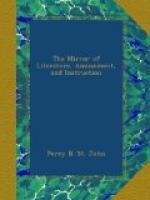There is another great difference between Tragedy and Comedy, and that is, with regard to diction: the language made use of by Comedy is natural and proper, while that of Tragedy is laboured and elevated; we meet not unfrequently with long declamation and sentences highly polished, whereas passion never speculates in this manner; the feelings of nature dictate the simplest language, and generally find a vent in broken sentences, as we find them in the Greek tragedians.
The unities of the drama are rules which are the result of good sense, and serve greatly to heighten the entertainment of the stage; they undoubtedly tend to keep up the necessary illusion that we are witnessing scenes in real life, and the more they are acted up to, the greater is the merit of the piece, and the more perfect the effect produced. Now, Comedy rarely breaks through these rules; for, from its nature, the events recorded are frequently comprised within the space of a day; and there is the same regard paid (as far as it is possible) to unity of place as well as time. Tragedy, at least modern Tragedy, (with the exception of Cato and one or two more) entirely disregards these rules, and we sometimes find the hero of the piece has grown ten years older within the short space between the acts, or else that he has travelled from one country to another in the same period of time. Thus, in Julius Caesar, Brutus, in one act is at Rome, and another in Thessaly. Again, in Coriolanus, now we find him expelled by the Romans, afterwards residing amongst the Volscians, and eventually marching an immense army to the gates of Rome; all within the space of two or three hours: this is a sad blow to any scenic illusion, and tends to weaken, if it does not entirely break, the thread of the imagination.
There is one point in which I consider both Tragedy and Comedy, in modern days, to be at fault, and that is in the constant introduction of love on our stage. We cannot frequent the theatre without being sickened by the repetition of some nauseous courtship and love-making, the particulars of which, even in real life, can be agreeable to none but the parties themselves. This blemish is said to have arisen during the earlier




